Smoke Detector Basics and Troubleshooting
2011 August 24 by Mark Ingraffia
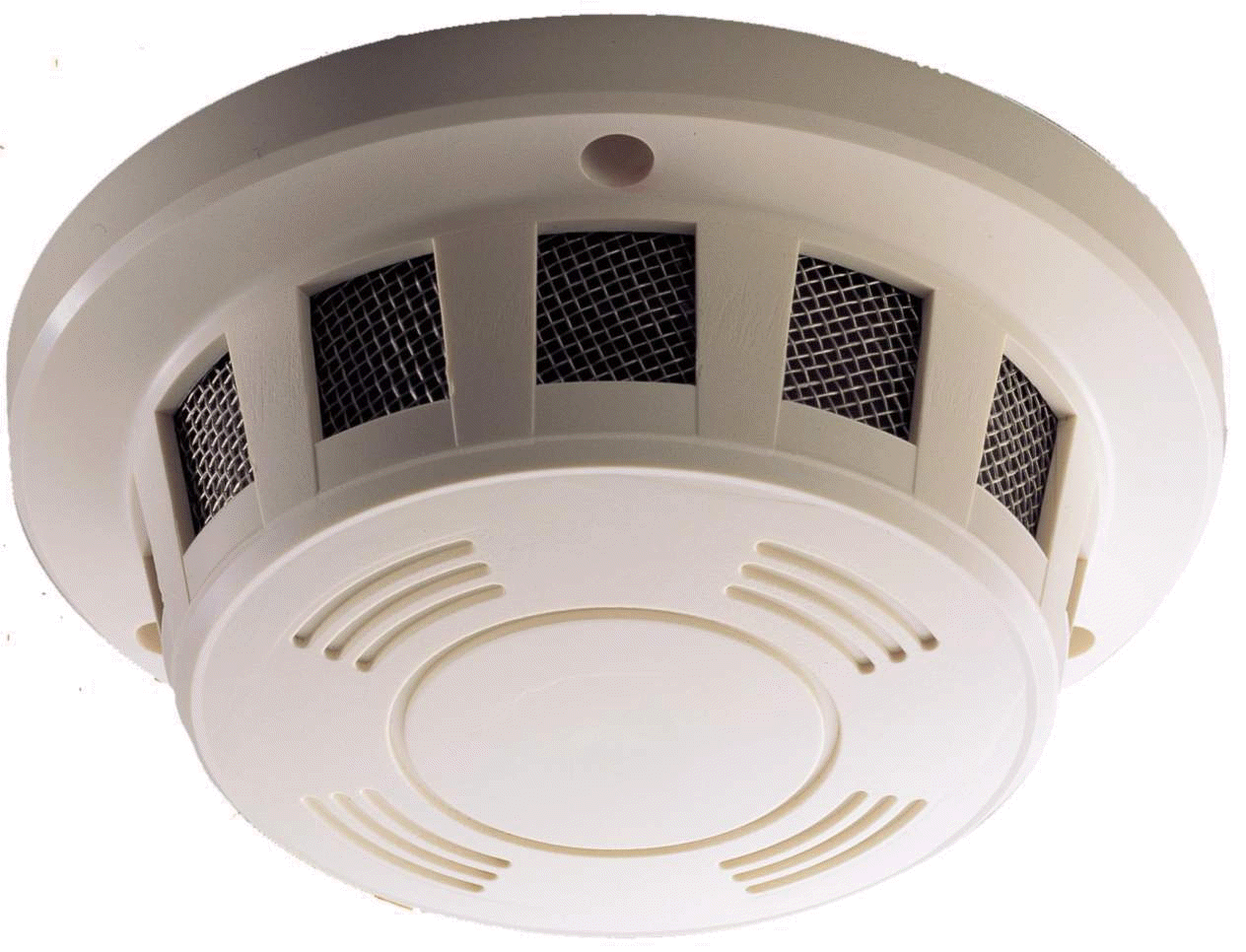 Every once in a while, Ingraffia Home Inspections likes to browse around the Internet and find interesting articles on subjects that a Home Inspector in a different area may have to deal with. Just recently, we ran across a well-written article regarding the importance of smoke detectors, so we thought we would share it with you. When you are ready for your home pre-purchase or pre-sale home inspection, do not hesitate to call us at (714) 371-8422.
Every once in a while, Ingraffia Home Inspections likes to browse around the Internet and find interesting articles on subjects that a Home Inspector in a different area may have to deal with. Just recently, we ran across a well-written article regarding the importance of smoke detectors, so we thought we would share it with you. When you are ready for your home pre-purchase or pre-sale home inspection, do not hesitate to call us at (714) 371-8422.
This article was written by an author named Josh on the InspectingPhoenix.com website. You may see the original article by clicking here, or you may read the article below.
“Smoke detectors are a vital safety feature that should be installed in every home; they save lives and protect property. Not only is it important to have enough properly located smoke detectors but they should also be properly maintained in accordance with the manufacturer’s instructions. A poorly maintained smoke detector can lead to nuisance alarms or an inoperable unit.
During the course of our home inspections we inspect the smoke detectors for proper operation. It is all too common to find missing or inoperative smoke detectors in people’s homes.
The National Fire Protection Association (NFPA) standards recommend:
- A smoke detector on every level of the home
- A smoke detector outside each sleeping area
- A smoke detector inside each bedroom
- Locate smoke detectors on ceiling at least 4 inches from the wall
- Locate smoke detectors high on a wall between 4 and 12 inches from the ceiling
- Interconnected smoke detectors that all sound when one alarms
- Use combination Ionization and Photoelectric smoke detectors
There are some areas that are not ideal to locate smoke detectors, avoiding these locations can reduce nuisance alarms and ensure your smoke detectors stay in proper working order longer. Below are some basic guidelines to use for proper placement of the smoke detectors:
- Try to locate smoke detectors at least 20 feet from appliances such as furnaces and ovens
- Locate alarms at least 10 feet from high humidity areas such as a shower
- Locate smoke detectors at least 3 feet from heating and air conditioning vents
Maintenance of your smoke detectors is very important to insure proper operation. Below are some general maintenance guidelines. Manufacturer’s instructions should always be followed.
- Replace batteries annually or when the smoke detectors start chirping
- Vacuum the smoke detector regularly using the soft brush attachment to prevent dirt buildup in the detection chamber. This will prevent nuisance alarms due to false indications.
Troubleshooting smoke detectors can require a little bit of trial and error, especially in interconnected systems. Following these steps should help in diagnosing and fixing the problem.
Chirping – Smoke detector emits a high pitch chirp about once a minute:
- Low battery – Smoke detectors typically chirp to indicate a low battery. In an interconnected system only the smoke detector with the low battery should chirp.
- Battery drawer open – If the battery drawer is not fully closed the batter will not make contact with the terminals. Ensure the battery drawer is fully closed.
- Battery pull tab not removed – New smoke detectors are shipped with a plastic pull tab between the battery and battery terminals to prevent operation. If this is left in place the smoke detector does not sense the battery and assumes it is dead. Remove the tab.
Nuisance Alarms – These are just a few of the things that can cause nuisance alarms. Unplugging a smoke detector due to nuisance alarms is dangerous and provides no protection in case of a fire.\
- Dust or dirt – If there is dust or dirt in the sensor chamber the smoke detector can sense this as smoke. You should vacuum the smoke detector with the soft brush attachment.
- Grease or cooking vapors – If the smoke detector is located in an area with cooking vapors, grease, combustion gasses or other contaminants the sensor chamber can develop a greasy film. This greasy film can cause the alarm to sound. Due to the difficulty of cleaning this film and the risk of damage to the smoke detector, I recommend you replace the smoke detector.
- Power interruption – In a hardwired smoke detector the alarm will sound briefly if the power is interrupted and then restored. Power interruptions can be caused by loose wire connections. Ensure that the wires are properly and securely connected. Use caution when working with hard wired smoke detectors as they are connected to the homes electrical system. Always ensure that the circuit breaker for the smoke detectors is off when working on this system. Call a qualified electrician if you do not feel comfortable working with electricity.
- Interconnected Alarm – In an interconnected alarm system if one smoke detector goes off all others will alarm making it difficult to diagnose. Every manufacturer is different but most have a way of indicating which smoke detector is initiating the alarm. Look at the lights on the detectors, usually the one initiating the alarm will have a flashing light during the alarm to let you know it is the one that sounded the alarm.
- Location – Ensure the smoke detector is not located near furnaces, ovens, showers or supply air vents. You may need to relocate a smoke detector if it is not in an ideal location.
- Replacement – Smoke detectors are fairly cheap. If you try everything else and cannot get the detector to stop going off try replacing the unit.
This is just a general guideline to help you with smoke detector location and troubleshooting, always follow the manufacturer’s recommendations and the NFPA guidelines when working with smoke detectors.”
The Weird Things You Find on a Home Inspection in Westminster
2011 August 23 by Mark Ingraffia
Being a home inspector isn’t always the most glamorous job available, but sometimes we run across items during an inspection that are an ultimate risk factor, dangerous, and sometimes down-right funny. We have searched the web to find a few examples (although I’m sure there are MANY more) of what NOT to accept as a “repair” from a local handyman, contractor or ANYONE you pay to work on your home. If your spouse is a DIY’er, make sure the repair does not wind up like these.
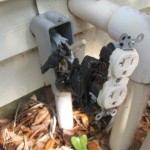 Whenever you are working with outdoor electricity, you must ensure that the wiring is properly covered. Using electrical tape to cover the wiring with caps to connect the lines is not a smart, or even legal way to connect an exterior plug. Even the receptacle itself is not the right grade.
Whenever you are working with outdoor electricity, you must ensure that the wiring is properly covered. Using electrical tape to cover the wiring with caps to connect the lines is not a smart, or even legal way to connect an exterior plug. Even the receptacle itself is not the right grade.
Note: when installing outdoor plug outlets, be sure they are GFI rated and are properly covered with a lid when not in use. Any exposure to water may cause significant damage to your electrical system and may even cause a fire.
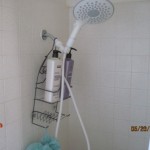 Look closely. Can you spot what’s wrong in this picture? Look closer. That’s it! Why on earth would there be an electrical outlet IN THE SHOWER? Other than being extremely dangerous, this is prohibited by building codes.
Look closely. Can you spot what’s wrong in this picture? Look closer. That’s it! Why on earth would there be an electrical outlet IN THE SHOWER? Other than being extremely dangerous, this is prohibited by building codes.
The best way to resolve this issue would be to re-route the outlet to outside of the shower stall, possibly on a neighboring wall that the wires currently share.
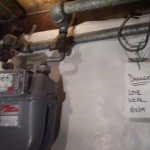 Having exposed LIVE electrical wiring is very dangerous to all occupants. Having a LIVE electrical wire next to your gas meter can be deadly. The slightest leak combined with an electrical surge can be devastating and can be an ututer disaster.
Having exposed LIVE electrical wiring is very dangerous to all occupants. Having a LIVE electrical wire next to your gas meter can be deadly. The slightest leak combined with an electrical surge can be devastating and can be an ututer disaster.
If at any time you see live, uncovered electrical wires, call a licensed and certified electrician immediately.
Ingraffia Home Inspections is dedicated to ensuring that your future home is completely safe and free from quick fixes that may cost you thousands of dollars in repairs later down the line. Call us today at (714) 371-8422 and let our home inspectors in Westminster save you from the local handyman who may be your worst nightmare.
The Purpose of Home Inspections in Dana Point
2011 February 22 by Mark Ingraffia
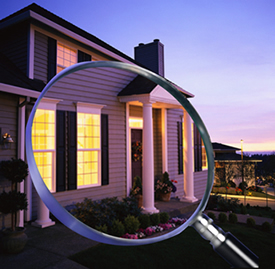 The purpose of a home inspection in Dana Point, CA, is to inform the individual buyer of the current condition of the home. The purchase contract and the agreed price between the buyer and seller are largely based upon the outcome of your residential home inspection. That’s why when you call Ingraffia Home Inspections at (714) 371-8422, you can rest assure knowing that you will receive both the experience and the knowledge for a thorough and detailed home inspection.
The purpose of a home inspection in Dana Point, CA, is to inform the individual buyer of the current condition of the home. The purchase contract and the agreed price between the buyer and seller are largely based upon the outcome of your residential home inspection. That’s why when you call Ingraffia Home Inspections at (714) 371-8422, you can rest assure knowing that you will receive both the experience and the knowledge for a thorough and detailed home inspection.
Continue reading »
Quality Home Inspections in Mission Viejo, CA
2011 February 8 by Mark Ingraffia
When you need detailed and efficient home inspection service in Mission Viejo, CA and the surrounding area, call Ingraffia Home Inspections at (714) 371-8422. Our home inspectors always thoroughly research and report in the most expeditious manner in order to simplify the process for our clients. From home inspections for purchase or estate planning purposes to all types of residential inspections, Ingraffia Home Inspections is here providing top of the line services.
Continue reading »
Aliso Viejo Home Inspections
2011 February 8 by Mark Ingraffia

Do you need assistance with a home inspection in Aliso Viejo, CA? If so, contact Ingraffia Home Inspections at (714) 371-8422. We have the real estate inspectors capable of handling your complete new home inspection. Whether you need a phase inspection or a total real estate inspection, we can help. Let our professional staff know exactly what we can do for you.
Continue reading »
Irvine Home Inspections
2011 January 21 by Mark Ingraffia
As an experienced home inspection company in Irvine, CA who offers a personal service and extremely accurate building inspection is but one call away to Ingraffia Home Inspections at (714) 371-8422. Our team of inspectors have been providing Orange County with quality residential and commercial inspections since 2003. Ingraffia Home Inspections offers only the best home inspections to ensure that your home will be up to code as well as beings secure and safe for years to come.
Continue reading »


